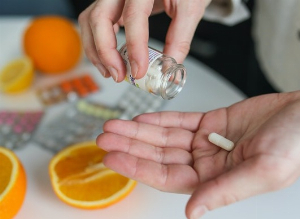What are monoclonal antibodies and what conditions do they treat?
Published 8 Nov 2021 • By Candice Salomé
Monoclonal antibodies are antibodies made by cells grown in laboratories. They are used to treat specific diseases such as certain chronic inflammatory conditions, cancers and, more recently, severe forms of COVID-19. Over 100 monoclonal antibody products have been licensed in the UK. These products have revolutionised the treatment of many health conditions.
But what are monoclonal antibodies exactly? What diseases do they treat? How are they administered? What are their side effects?
We explain it all in our article!

What are monoclonal antibodies?
During an infection, the human body develops an immune response with the aim of curing the infection by fighting against the invading infectious agent (virus, bacteria, etc.), but also of preventing future infection from this same agent.
Immune response is a complex set of biological defence reactions, one of which is the production of antibodies. Antibodies, by binding specifically to a particular element of the infectious agent, hinder its action and facilitate its eradication, thus fighting the infection.
Antibodies can also recognise foreign human cells (after a transplant) or mistakenly attack body cells. This is the case in autoimmune diseases such as lupus or multiple sclerosis, for example.
While the antibodies produced during these events are polyclonal, meaning they recognise various elements of the target cell, monoclonal antibodies, reacting specifically against only one element, are made in a laboratory for medical or scientific use. They are produced by cells in culture: bacteria, yeast, or mammalian cells. These cells have been selected and cultured for their ease of handling and their ability to produce a particular antibody.
Typically, the monoclonal antibody is produced by immune cells extracted from laboratory animals that have been exposed to the "target protein" (the element that the antibody will recognise). These immune cells are fused with other cells to produce identical strains of cells (cell clones), the most competent of which are selected and cultured to produce a good quality monoclonal antibody on an industrial scale.
For example, if these immune cells are exposed to a protein necessary for the proliferation of cancer cells, the antibody obtained will bind to this protein, preventing it from fulfilling its role and thus disrupting the growth of the tumour.
Thanks to monoclonal antibodies, it is thus possible to neutralise one protein in an extremely precise manner without affecting the others.
Which conditions do monoclonal antibodies treat?
In the United Kingdom, over 100 monoclonal antibody products have been licensed for the treatment of chronic inflammatory conditions, cancers, and for people at high risk of developing severe COVID-19.
Treatment of chronic inflammatory diseases
Chronic inflammatory diseases are conditions in which autoimmunity plays a role. The immune system reacts in an abnormal way and attacks cells in the body that it should not attack.
This is the case in the following conditions:
- Rheumatoid arthritis or ankylosing spondylitis: the cells of the joints, ligaments or tendons are attacked.
- Psoriasis or lupus: the skin cells are attacked.
- Multiple sclerosis: the nerve fibres are attacked.
- Crohn's disease or ulcerative colitis: the cells of the intestine are attacked.
Monoclonal antibodies developed to treat these diseases target the proteins involved in this abnormal immune response. By neutralizing these proteins, it is possible to reduce or even block the autoimmune response that underlies the disease.
Cancer treatment
In the treatment of cancer, the monoclonal antibodies used have various modes of action. Some are designed to neutralise substances necessary for tumour growth, while others bind to membrane receptors and block the proliferation of cancer cells by disrupting communication between cells. Other monoclonal antibodies prevent the formation of new blood vessels that the tumour needs to grow.
In addition, an antibody becomes "conjugated" when a chemotherapy molecule is attached to an antibody that recognises cancer cells. This brings the chemotherapy drug closer to its target, increasing its effectiveness and reducing its side effects.
Monoclonal antibodies used against cancer can be used alone or in combination with "conventional" chemotherapy drugs. In some cancers, monoclonal antibodies significantly increase the effectiveness of chemotherapy.
Treatment of adult patients at risk of severe COVID-19
In the UK, the MHRA has given authorisation for certain monoclonal antibodies (casirivimab/imdevimab, tocilizumab), in a secure setting, to treat adult patients at risk of severe COVID-19 as soon as symptoms appear.
Monoclonal antibody treatment is available to individuals who:
- Are over 50 years of age without the necessary antibodies to fight COVID-19 infection,
- Are aged 12-49 and are immuno-compromised.
How are monoclonal antibodies administered?
Monoclonal antibodies, if taken orally, would be destroyed by stomach acid. They must therefore be injected under the skin or by intravenous infusion, depending on the treatment, just like biotherapies in general.
Because of their technical nature and high cost, these treatments are often administered in an outpatient treatment centre.
Monoclonal antibodies warrant close monitoring because they interfere with the immune system and may increase susceptibility to certain illnesses.
Before prescribing treatment with monoclonal antibodies, the physician must ensure that the patient isn't affected by any infectious diseases. He or she will prescribe the following tests beforehand: a blood test, chest x-ray, screening for tuberculosis and viral hepatitis. A check-up by a dermatologist is also necessary to ensure that there is no risk of skin cancer.
In addition, the patient must be up to date with his or her vaccinations before starting the treatment.
With few exceptions, monoclonal antibody treatments should not be administered to pregnant or breastfeeding women. Contraception may be required throughout the course of treatment in women of childbearing age to avoid exposure to the foetus.
What are the side effects of monoclonal antibodies?
Long-term side effects differ depending on the nature of the drug, its mechanism of action and the target antigen.
The evaluation of the efficacy and the long-term side effects of monoclonal antibodies is still not well established.
Side effects and toxicity differ from one drug to another.
Nevertheless, some studies and post-marketing surveillance have reported the following:
- Blood disorders: Decrease in the number of one or more types of blood cells, including immune cells
- Recurrent infections: Due to the decrease in the number of immune cells
- Liver problems
- Kidney problems
However, only the doctor can evaluate the risks and benefits of monoclonal antibody treatments, taking into account several factors such as the severity of the disease and the patient's personal factors (age, history, etc.).
Was this article helpful to you?
Give it a "like" and share your thoughts and questions with the community in the comments below!
Take care!
Sources:
- Mullard, A. (2021). FDA approves 100th monoclonal antibody product. Nature Reviews Drug Discovery, 20(6), 491–495. https://doi.org/10.1038/d41573-021-00079-7
- Les anticorps monoclonaux, Vidal
- C’est quoi les anticorps monoclonaux ?, INSERM
- Anticorps monoclonaux, Institut Curie
- Coronavirus Covid-19. Les traitements par anticorps monoclonaux. Santé.fr

 Facebook
Facebook Twitter
Twitter


